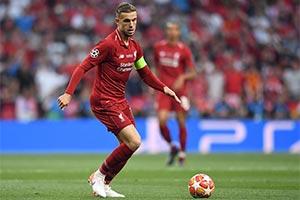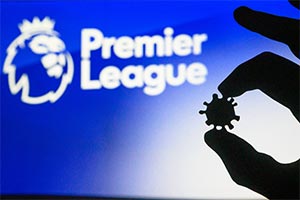Football faces up to an uncertain future
Jonathan Watson, IBA Finance CorrespondentThursday 4 February 2021

Governance issues, the impact of Covid-19 and a widening divide between rich and poor clubs are all threatening the ‘beautiful game’. Global Insight investigates how football can be saved.
The governance of football in England is a shambles. That’s the verdict of David Bernstein, a former Chairman of the Football Association, Manchester City and Wembley Stadium.
‘English football’s failure to speak with one voice over the past months of the Covid-19 crisis have only highlighted a dysfunctional and damaging structure’, he said in a letter written in mid-January this year to the UK’s Secretary of State for Digital, Culture, Media and Sport (DCMS), Oliver Dowden.
‘There is no overall leadership and therefore vested interests continue to prevail’, added Bernstein. ‘The financial disparity between rich and poor has frankly become obscene. The game is devoid of agreed priorities.’

FA Chairman David Bernstein speaks at The Kick Racism Out Of Sport event at Netanya Training Ground, Israel, 9 June 2013. REUTERS/Action Images/Alex Morton Livepic
In 2018/19, the income of the English Premier League (EPL) amounted to £5.6bn while the income of the division below, the Championship, was £785m. That’s a ratio of seven to one.
In recent years, a number of clubs in the English Football League (EFL, which represents tiers two to four of England’s football pyramid) have faced huge financial difficulties. Bury FC, for example, was expelled from the EFL in August 2019 after its problems escalated, and it failed to secure new ownership.
In addition, after a series of financial issues, Bolton Wanderers was taken over by administrators in May 2019 due to an unpaid tax bill of approximately £1.2m, with its survival later secured with a takeover by Football Ventures. Wigan Athletic entered administration in July 2020. In September 2020, Macclesfield Town were relegated from the fourth tier and then expelled from the division below after being wound up by the UK High Court over debts.
These problems have obviously been exacerbated by the pandemic. ‘The Premier League is the main income generator of English football’, said a report published in July 2020 by the UK Parliament’s DCMS Committee. ‘If it does not step up to help the English Football League, many more clubs will follow in Bury FC’s footsteps.’ Last November, ten EFL clubs said they were struggling to pay wages.
In many industries there is a strong desire to ‘build back better’ once the initial stage of the pandemic is over and the football sector is no exception. ‘The Covid-19 crisis presents an opportunity for football […] to “reset” and to introduce essential reforms to financial models, management structures and diversity and inclusion that will benefit the game in the long term’, the Committee’s report said. ‘The current football business model is not sustainable.’
In December 2020, the EPL and EFL agreed on a £250m rescue package to help the clubs in the lower divisions. The EFL is to be assisted in getting a £200m loan for clubs in the Championship. The package includes a £50m grant for the 48 clubs in League One and Two – tiers three and four of the pyramid.
The EFL Chairman, Rick Parry, said this was a ‘welcome, tangible commitment to the professional game at a time when it has needed it most’.
However, Bernstein was not impressed. Noting that clubs in the Championship already spend 107 per cent of their revenue on wages, he said that getting assistance in the form of loans ‘can only seem to be a recipe for even bigger problems in the future […] this is merely a short term “sticking plaster” and certainly doesn’t lay a finger on the long-term structural problems faced by so many clubs’.
Is independent regulation the solution?
Bernstein is a key member of the Manifesto for Change group that also includes former Manchester United player Gary Neville and ex-governor of the Bank of England Mervyn King. A report published by the group in October 2020, Saving the Beautiful Game, argued that ‘external involvement in the form of a regulator supported by statutory powers is required to reform the way our national game is governed. This is the only realistic way to bring real change, stability and long-term health to professional and grass roots football in this country’.
External involvement in the form of a regulator supported by statutory powers is required to reform the way our national game is governed
Extract from Saving the Beautiful Game by Manifesto for Change
The report contrasts the situation in England with governance arrangements in other countries such as France. On the other side of the Channel, it said, football and most other popular sports operate under a framework established in French law.
The ‘code du sport’ includes rules on governance, club ownership, player contracts and anti-doping regulations. ‘This is an example of how federal law and regulation can be used to create a framework for sport which is in the interests of the whole nation and could act as a lesson for introducing legislation to improve governance in English football’, the report said.
It also highlights the role of the ‘commissioner’ in US sports including American football, baseball, basketball and ice hockey. The commissioner’s role includes overseeing competition rules, negotiating TV and advertising contracts and expanding the reach of the game globally. ‘Such an individual with similar powers might be useful in football’, the report said.
As huge sums of money are in play in the football industry, transparency, integrity and compliance matter more than ever, says Eric Mayer, Secretary of the IBA Anti-Corruption Committee and a partner at German law firm GSK Stockmann.
As huge sums of money are in play in the football industry, transparency, integrity and compliance matter more than ever
Eric Mayer
Secretary, IBA Anti-Corruption Committee
‘If the football market is not capable of regulating itself successfully – either on a national or a supranational level – regulation will have to enforce the appropriate level of actual transparency, integrity and compliance in this “big business” environment’, says Mayer.
However, in most countries, football is run by the national governing association and the introduction of external bodies could be met with widespread resistance. ‘Personally, I believe self-regulation on this matter would work better’, says Simone Lahorgue Nunes, Chair of the IBA Sports Law Subcommittee and a partner at Brazilian law firm Levy & Salomão Advogados.
‘In most countries no independent regulator exists, it is just the national or similar football association’, adds Tomislav Šunjka, Senior Vice-Chair of the IBA Asset Recovery Subcommittee and Founder and Principal of Serbian law firm ŠunjkaLaw. ‘Any independent regulator would be immediately challenged with questions about who regulates and controls the regulator.’
In addition, the biggest clubs in each European country frequently threaten to abandon their national leagues in favour of a European ‘super league’, the membership of which they would decide themselves.

Jordan Henderson plays during the 2018/19 UEFA Champions League final at Wanda Metropolitano Stadium, Madrid, Spain, 1 June 2019. Shutterstock.com/Cosmin Iftode
‘This shows a determination to be free of external regulatory control’, says Šunjka. ‘Powerful clubs would rather not have to deal with their national associations or supranational bodies like UEFA [the Union of European Football Associations] or FIFA [the International Federation of Association Football]. Their aim is to create the best possible football product in the most efficient way they see fit.’
How to level the playing field
The huge financial disparity between rich and poor in football tends to mean that the same handful of clubs win all the key competitions.
Those with the most money collect the best players, pay them astronomical amounts and then collect all the trophies. There is a very real risk of the current set-up eroding the competitiveness that makes the sport appealing in the first place. If they perceive that the game is dominated by a self-selecting, self-perpetuating and exclusive oligarchy, supporters become disillusioned.
‘To keep the game interesting and amazing, and to maintain its market value, any league has to be refreshed from time to time with “new faces” as champions or participants’, says Šunjka. ‘Otherwise, in time, supporters and investors will lose interest.’
To keep the game interesting and amazing, and to maintain its market value, any league has to be refreshed from time to time with ‘new faces’ as champions or participants
Tomislav Šunjka
Senior Vice-Chair, IBA Asset Recovery Subcommittee
European football’s governing body UEFA attempted to respond to the situation by introducing the ‘financial fair play’ regulations (‘FFP rules’). These were intended to prevent professional football clubs spending more than they earn in the pursuit of success. The FFP rules were agreed in principle in 2009 by UEFA’s Financial Control Panel and implemented in 2011.
The FFP rules provide for sanctions to be taken against clubs who exceed spending, over several seasons, within a set budgetary framework. The severest penalty is disqualification from European competitions such as the Champions League. Other penalties include fines, the withholding of prize money and player transfer bans.

Shutterstock.com/kovop58
Manchester City, Liverpool and Paris Saint-Germain (PSG) have all been investigated under the FFP rules – although Liverpool were cleared of breaching the regulations in 2015, while UEFA’s investigation into PSG was shut down following an appeal by the club to the Court of Arbitration for Sport (CAS) in 2019.
While the intentions of encouraging greater financial caution in football have been well received, the FFP rules have been accused of limiting the EU internal market, failing to reduce football club debt and protecting the status quo.
In 2015, UEFA said the FFP rules would be ‘eased’ in response to a number of lawsuits going through the courts. In 2020, Manchester City’s two-year ban from the Champions League and Europa League for breaching the FFP rules was overturned at the CAS, and its fine reduced.
‘UEFA’s Financial Fair Play must become a tiger with teeth – no matter how big and important the transgressing club might feel’, says Mayer.
One proposal that seems to be gaining momentum is the introduction of salary caps. ‘They seem to be a useful tool to enhance football’s competitiveness’, says Lahorgue Nunes.
Salary caps seem to be a useful tool to enhance football’s competitiveness
Simone Lahorgue Nunes
Chair, IBA Sports Law Subcommittee
Although some studies and reports have found no evidence that they provide more balance between clubs, specialists argue that this can be proved empirically. For instance, leagues where there are big investors and no salary caps often produce the same winners. In Spain, Real Madrid and Barcelona are the only clubs to have won La Liga – the top men’s football division – since Valencia in 2004.
In France, the vast wealth of PSG has led the club to the title in seven of the last eight seasons. In Germany, Bayern Munich have been the champions for eight years in a row. In Italy, Juventus have won the last nine annual championships and Inter Milan won five in a row between 2006 and 2010.
‘Conversely, taking into consideration the North American experience of having salary caps rules in some sports, such as Major League Soccer, the National Basketball Association and the National Football League, the outcome seems to be different. The list of champions over recent years does not show such a concentration’, Lahorgue Nunes says.
In Brazil there are no salary caps, she adds. Usually, the clubs that spend most on players have better results. Out of four clubs with the biggest investments, one was the winner and two of the others won second and third place in the 2019 national championship.
In many countries, salary caps are starting to be seen as part of a cost control strategy in the troubled age of Covid-19, as well as a way of maintaining competitiveness. In England, clubs in League One and League Two voted in August for the introduction of salary caps of £2.5m and £1.5m respectively. This decision took effect straight away.
When calculating total salary spending, the ‘cap’ includes basic wages, taxes, bonuses, image rights, agents’ fees and other fees and expenses paid directly or indirectly to all registered players. Payments directly linked to a club’s progress in cup competitions or promotion are excluded from the cap, while any income generated from players going out on loan is deducted from the club’s salary cap calculation.
However, the Professional Footballers’ Association (PFA) of England and Wales described the cap as potentially ‘unlawful and unenforceable’ and has launched a legal challenge. The PFA said the EFL had failed in a legal obligation to fully consult the players’ union over ‘any potential changes to a player’s conditions’.
Salary caps actually existed in English football until 1961, although back then they were known as the maximum wage. This was applied to individuals rather than across a squad. Players were allowed to earn no more than £20 per week (and £17 per week through the close season, when the sport isn’t played professionally).
It was a system that led to widespread abuse, with clubs making secret payments to players to supplement their salaries.
‘Whereas the general idea is comprehensible, in practice it has become important to ensure that loopholes circumventing the rules, such as signing-on fees, must be closed’, says Mayer. ‘In the US, another complication is that there are different tax burdens in different states, making the playing field uneven.’
Mayer believes the debate on salary caps in football has similarities with corporate governance discussions in private enterprises. ‘How much should a chief executive be entitled to earn compared to the average blue-collar worker?’ he asks. ‘The “say on pay” debate in Germany and EU Member States might be reignited by the Covid-19 crisis.’
Fair pay is also closely related to ever-increasing discussions about the environment, social and governance (ESG) side of corporate activities, where grossly unequal remuneration in general mirrors unsustainable business models.
Who should be allowed to own football clubs?
The huge amount of money that players get paid tends to be determined by the club’s owners. Manchester United and Liverpool have US private equity investors. PSG and Manchester City are owned by Qatar and Abu Dhabi sovereign wealth funds respectively. Chelsea is owned by Russian high net worth individual Roman Abramovich.
At the other end of football’s financial scale, changes of ownership often create huge financial problems for clubs. In England, the Football Supporters’ Association recently made a series of proposals to the Football Association, including a new ‘code of practice on the stewardship of football clubs’.
This sets out guidance for clubs and owners on a range of issues, including name changes, playing colours and badges, stadium location, training facilities and the failure to honour wages and tax commitments. It would also stop owners loading debt onto a club in order to finance its purchase.
In Germany, the 50+1 rule created by the German Football Association states that football clubs are not allowed to play in the German league (Bundesliga) if commercial investors have 50 per cent or more of the shares.
According to the Bundesliga, this means that private investors cannot take over clubs and potentially push through measures that prioritise profit over the wishes of supporters. Many feel the rules simultaneously protect against reckless owners and safeguard the democratic customs of German clubs.
‘In Brazil, football clubs are usually not-for-profit associations, but there are bills of law that aim to incentivise and regulate their conversion into private companies’, says Lahorgue Nunes. ‘Although the few cases of conversion in Brazil were successful, the fans were unhappy, as in the case of Bragantino.’
Bragantino was one of the most well-established teams from São Paulo state. After years of bad management and bad results, the club entered into a partnership granting the global company Red Bull powers to manage it at its sole discretion. As Red Bull implemented changes to some traditional elements of the club, such as the jerseys and the name, fans criticised the move, arguing that the club was losing its soul.
The club did however finish Brazil’s Serie B league in first place in 2019, and were promoted as a result.
Lahorgue Nunes does not believe strengthening the rules on ownership is the right move. ‘Instead, the internal rules of each club should set forth the limits to private investments as well as eventual measures to preserve the essence of the club.’
Mayer questions the recent involvement of sovereign wealth funds in football. ‘Why do we not discuss whether states are eligible club owners at all?’ he asks. ‘Do we really continue to close our eyes on that very peculiar form of extended foreign policy by very well-known states or their sovereigns? Sport and business is already a complex combination, but when sport and policy mix, this creates something of a Gordian knot.’
Mayer believes that the social importance of football, and sport generally, should never be forgotten – especially in times of crisis. Mayer says that without the functioning club system, which exists even in the smallest German village, 'the often-praised community cohesion and integration capability of this country would be very different'.
Those who run football need to remember what the sport is for. It is not designed to be a vehicle for ever-increasing financial returns. It is a way of binding communities together in pursuit of a common goal. Covid-19 may have inflicted huge damage on football, but perhaps it has also created the conditions that will enable the sport to rediscover its values and secure its long-term future.
The values of footballers

Marcus Rashford plays during the UEFA Super Cup Final at the Philip II Arena in Skopje, Macedonia, 8 August 2017. Shutterstock.com/Ververidis Vasilis
As money has flowed into football, those who play the game have gained a reputation for tasteless, feckless lifestyles. But there are signs that this is changing. Take Manchester United’s Marcus Rashford, for example. When the Covid-19 crisis began, he was a part of the ‘Players Together’ initiative, which donated £4m to help the efforts of the UK National Health Service in tackling the pandemic.
Later in 2020, he successfully lobbied the UK government to provide free meals for underprivileged children during the summer holidays. When politicians voted against extending the policy until Easter 2021, he campaigned vocally for a U-turn until the government changed its mind. He also formed a taskforce with some of the UK’s biggest food brands to try to help reduce child food poverty.
Alongside his food campaigning, Rashford has launched an initiative with the publisher Macmillan to provide books for children who have none. He is writing his own book for children who are facing similar adversities to those he faced. He has admitted that he did not start reading until he was 17.
Another Manchester United player, Juan Mata, helped to create the ‘Common Goal’ initiative. Its members, including US women’s World Cup winner Megan Rapinoe and Liverpool manager Jürgen Klopp, agreed to donate one per cent of their income to football-related charitable projects around the world.
Former Chelsea player Didier Drogba set up a charitable foundation in 2007. The foundation opened a hospital in 2016 and converted it to a Covid-19 treatment centre in 2020. It also opened its first school in 2018.
Another member of the ‘Players Together’ initiative, Liverpool captain Jordan Henderson, has appeared in a video filmed to support the Black Lives Matter movement.
‘What Marcus [Rashford] has done over the last 12 months is incredible’, said Henderson before Liverpool played Manchester United at an empty Anfield stadium in January. Henderson ignored the fact that the two clubs are traditionally bitter rivals. ‘He has battled against food poverty, given a voice to kids who otherwise wouldn’t have one and used his own reputation for the benefit of others.’
Jonathan Watson is a journalist specialising in European business, legal and regulatory developments. He can be contacted at jonathan.watson@yahoo.co.uk
Header pic: Alamy Stock Photo/Delphotos
